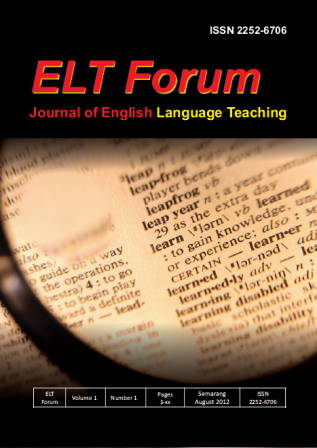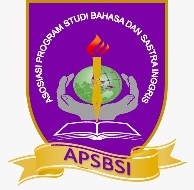THE BENEFITS OF USING DIALOGUE JOURNAL WRITING FOR IMROVING STUDENTS’ WRITING OF PERSONAL LETTER
Abstract
This study aims at investigating how dialogue journal writing benefits students’ writing of personal letter and how significance the resulted improvement is. Personal letter is important for it is used by people in their daily lives in diverse forms. Meanwhile, dialogue journal is chosen as the method for it is powerful to bridge learners’ needs of supplementary learning times and a private student’-teacher’s interaction. The research design of the study is mainly qualitative. However, quantitative analysis is still used to reveal students’ overall writing proficiency and the significance of students’ improvement. The five writing aspects mentioned by Brown (2004) are used as the basis of both analyses. The qualitative analysis attempts to describe how the students perform the aspects in their writing. Meanwhile, the quantitative analysis tries to assess students’ performance of the aspects by giving each aspect a score realization according to the criteria outlined in Brown’s rubric of writing assessment. The results of the analysis show that students’ writing improves all the aspects quite well. The biggest improvement lies in the content aspect. Majority of students’ earlier writing fails to address the topic of writing. Nonetheless, all of their final writing has already addressed the topic correctly. Meanwhile, the aspect of style and quality of expressions seems to undergo the least improvement. Some vocabularies are still found to be incorrectly used. However, students’ later writings exhibit a better sentence variety realized through the use of various cohesive devices. The improvement unfolded in the qualitative analysis is supported by the findings of the quantitative analysis of which all of the twenty students improve their writing scores in the final test. Some scores are even elevated quite significantly. The improvement of the five aspects presented in students’ later writing has turned the writing to be more communicative. Therefore, the mastery of the aspects is very beneficial. Since all the five aspects belong to the micro and macro-skills of writing, the teaching of these skills is then imperative to be given.References
Beh, Y. 1997. Current Research in Southeast Asia. RELC Journal, 28 (1), 175 – 179. In Beryl, Exley. 2005. Learner Characteristics of Asian EFL students: Exceptions to the ‘Norm’. In Young, Janelle, Eds. Proceedings Pleasure Passion Provocation. Joint National Conference AATE & ALEA. 2005. Pages 1 – 16, Gold Coast, Australia.
Brown, D. H. 2001. Teaching by Principles: An Interactive Approach to Language Pedagogy, Second Edition. New York: Longman.
Brown, D. H. 2004. Language Assessment: Principles and Classroom Practices. New York: Pearson Education.
Jones, Paul. 1991. What Are Dialogue Journals?. In Joy Kreeft Peyton and Jana Staton (Eds.), Writing Our Lives: Reflections on dialogue journal writing with adults learning English. New Jersey: Prentice Hall.
Levinson, Jay Conrad. 2007. Guerilla Marketing. New York: Houghton Mifflin.
Peyton, Joy Kreeft. 2000. Dialogue Journals: Interactive Writing to Develop Language and Literacy. National Center for ESL Literacy Education.
Saleh, Mursid. 2011. Linguistic and Educational Research. Semarang: UNNES press.



_.jpg)
_.jpg)




